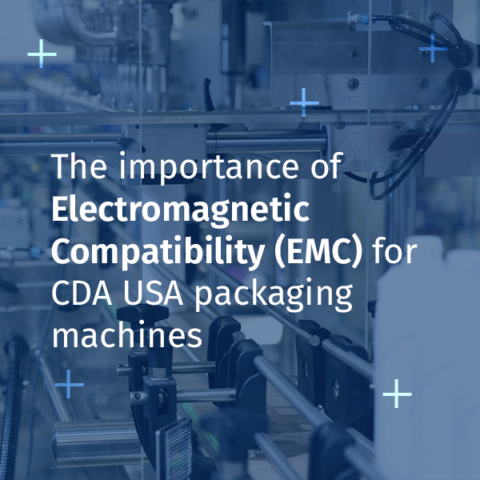What is EMC?
Electromagnetic Compatibility (EMC) is a technical field that examines how electrical and electronic devices coexist within an environment without causing interference to each other. Specifically, it focuses on the ability of equipment to operate optimally in its electromagnetic environment without disrupting or being disrupted by other devices. EMC is crucial for ensuring the safety and performance of equipment, especially in environments where multiple machines operate simultaneously.
EMC testing ensures that machines do not emit interference that could compromise the accuracy of packaging operations, such as those performed by our filling, capping, and labeling machines, while also ensuring the safety of operators.
EMC and CDA packaging machines
In the design, production, and use of electrical and electronic devices, electromagnetic compatibility is a critical consideration. It ensures that these devices can operate without interfering with other nearby electrical equipment. CDA’s packaging machines, including fillers, cappers, labelers, and monoblocks, incorporate electrical and electromagnetic components. Therefore, EMC is integrated from the design phase by our research and development (R&D) department and continues to be monitored during production by our teams in our Narbonne workshop. A set of best practices is established to ensure reliable and safe operations.
Importance of EMC for CDA packaging machines
CDA’s packaging machines, including automatic fillers like the K-Line S, automatic cappers like the VS 2000, and labelers like the Ninon Mix, must comply with EMC standards to function efficiently without causing major interference. This is crucial for maintaining optimal performance in a production environment.
Practical applications for CDA machines
At CDA, all our machines undergo rigorous EMC testing. For example, during the design of the E-Fill SW monoblock, we ensure it does not emit EMC levels that could disrupt other machines while being protected from their emissions. These precautions ensure the safety and efficiency of all our equipment.
Advantages of EMC compliance for packaging machines
Ensuring that packaging machines comply with EMC standards offers several significant benefits:
- Enhanced Safety: Machines that comply with EMC standards minimize the risk of harmful interference, ensuring a safer production environment.
- Market Access: Compliance with international EMC standards facilitates access to various global markets, increasing business opportunities.
- Product Reliability: Strict adherence to EMC standards enhances the reliability and reputation of products in the market, demonstrating a commitment to quality and safety.
Conclusion
Electromagnetic compatibility is a crucial aspect for machine manufacturers. By ensuring that equipment such as fillers, cappers, and labelers meet EMC standards, manufacturers not only ensure the safety and reliability of their products but also their compliance with international standards. CDA remains committed to providing high-quality packaging machines that meet EMC requirements, ensuring optimal performance and high reliability for our clients across various industries.







